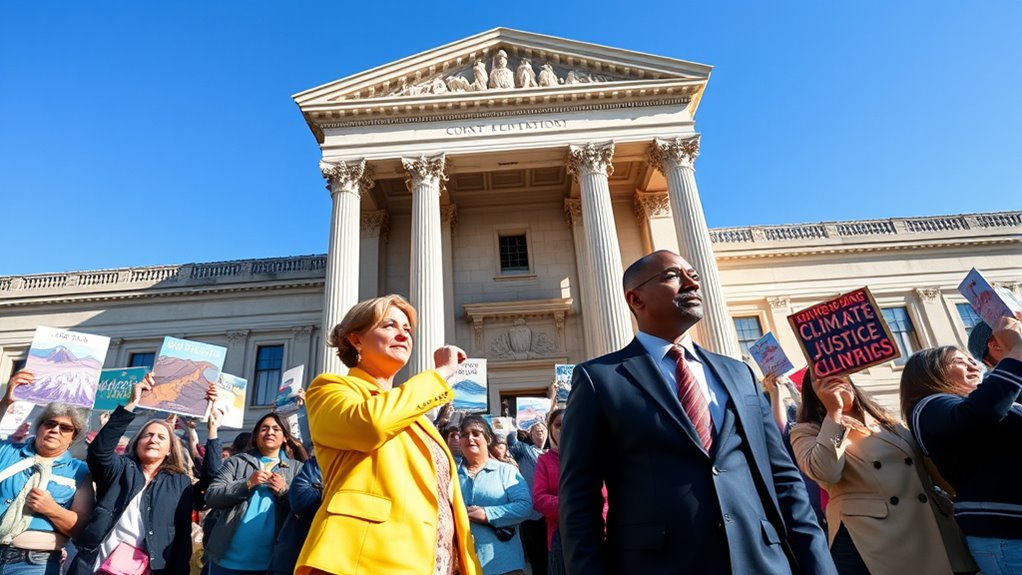Climate litigation allows you and other citizens to hold governments accountable through court cases that demand stronger climate policies and transparency. By using legal strategies based on constitutional, environmental, or human rights laws, you can challenge inadequate actions and push for reforms. Court rulings can force governments to prioritize climate action and set legal precedents that prevent backsliding. Continue exploring to discover how legal efforts are shaping the future of climate accountability.
Key Takeaways
- Climate litigation allows citizens to hold governments accountable for failing to meet environmental and climate obligations.
- Court cases can mandate governments to strengthen climate policies and enforce compliance with international standards.
- Legal strategies leverage constitutional and human rights laws to push for policy reforms and environmental justice.
- Judicial rulings set legal precedents that influence future climate legislation and reinforce accountability.
- Citizens’ legal actions complement advocacy efforts, driving broader policy reforms and increased governmental climate action.

Have you ever wondered how the legal system is holding governments and corporations accountable for climate change? It turns out, legal strategies are becoming a powerful tool for citizens and environmental groups to push for meaningful change. These strategies often challenge existing policies, demand transparency, and seek to hold polluters responsible for their contributions to global warming. By filing lawsuits, advocates aim to compel governments to strengthen climate policies and adopt more aggressive reforms that curb emissions and protect natural resources. These legal actions serve as a means of enforcing existing laws and pressuring policymakers to implement new policy reforms aligned with scientific recommendations and international commitments. The use of climate litigation has been instrumental in driving policy reforms and raising awareness about environmental issues. Furthermore, strategic litigation often targets gaps in climate policy that allow continued environmental degradation. Legal strategies are tailored to target specific gaps in climate policy, often using constitutional, environmental, or human rights laws to make a compelling case. For example, lawsuits may argue that governments have a duty to protect their citizens from the harmful effects of climate change, or that failing to regulate greenhouse gases violates constitutional rights or environmental statutes. This approach not only seeks immediate remedies—such as halting certain projects or enforcing stricter emissions standards—but also aims to set legal precedents that shape future policy reforms. When courts rule in favor of climate plaintiffs, they can effectively mandate governments to accelerate their climate action plans, ensuring that policy reforms happen more swiftly and effectively. You should also recognize that these legal efforts often go hand-in-hand with advocacy for broader policy reforms. Court victories can serve as catalysts for legislative change, inspiring lawmakers to craft stronger climate laws and regulations. Additionally, understanding the role of legal experts can enhance the effectiveness of climate litigation efforts, as their expertise can help craft more persuasive legal arguments. Conversely, policy reforms influenced by legal rulings can reinforce the legal framework, making it harder for governments or polluters to backslide. This synergy creates a cycle where courts and policymakers work together to advance climate action, with citizens playing a critical role in holding both accountable. As climate litigation gains momentum worldwide, it’s clear that strategic legal actions are becoming an essential part of the broader movement to combat climate change. They offer a pathway for communities to demand accountability, push for reforms, and ensure that governments prioritize environmental sustainability.
Frequently Asked Questions
How Do Climate Lawsuits Impact National Policy Changes?
When you ask how climate lawsuits impact national policy changes, you’re exploring their role in shaping legal norms. These lawsuits create policy influence by pressuring governments to act more sustainably and hold them accountable. They also set legal precedents, guiding future decisions. As a result, courts can compel policy reforms, making governments more responsive to climate challenges. Your involvement in supporting these lawsuits helps promote meaningful policy shifts for a healthier planet.
What Are the Success Rates of Climate Litigation Cases Worldwide?
You might think climate litigation always leads to change, but case success rates vary globally. While some courts uphold strong environmental protections, others are more hesitant, reflecting differing legal and political landscapes. Litigation trends show an upward trajectory, with more cases challenging governments and corporations. Overall, success depends on jurisdiction, case strength, and public support, but these efforts are essential for holding entities accountable and advancing climate action.
How Do Courts Determine Governments’ Climate Obligations Legally?
When courts determine governments’ climate obligations, they rely on legal standards and judicial reasoning. You’ll see judges analyze international agreements, national laws, and constitutional principles to assess whether governments are meeting their responsibilities. They interpret these legal frameworks to hold governments accountable, considering scientific evidence and human rights. Ultimately, courts use established legal standards to decide if governments have fulfilled their climate duties, ensuring accountability through careful judicial reasoning.
Can Individuals or Small Groups Effectively Initiate Climate Lawsuits?
They say, “Every journey begins with a single step,” and that’s true for climate lawsuits. As an individual or small group, your legal standing matters, but courts often require proof of direct harm. Community activism can amplify your voice, pressuring governments to act. While initiating lawsuits is challenging, collective efforts and clear evidence can make your case stronger and help hold governments accountable for climate obligations.
What Role Do International Courts Play in Climate Justice?
International courts play a vital role in climate justice through transnational enforcement of environmental laws and standards. They can address climate issues beyond national borders, holding governments and corporations accountable. Judicial activism often drives these courts to interpret laws broadly, advancing climate action. You can influence this process by supporting international legal initiatives and advocating for stronger transnational enforcement, ensuring that global climate commitments are upheld and justice is served across nations.
Conclusion
You hold the power to turn the tide, like a compass guiding a sinking ship back to safe waters. Citizens and courts are the beacons shining through the storm, demanding accountability from governments. Every legal victory is a stepping stone across turbulent waters, inching us closer to a sustainable future. Remember, your voice is the wind that can change the course of this climate voyage—strengthen it, and watch the world transform.









